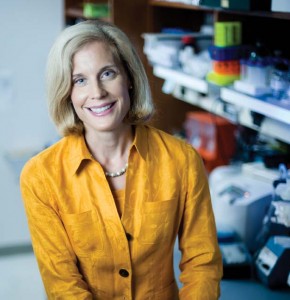The Promise of Cancer Immunotherapy
June 15, 2015

Photo by Joe Howell
The idea of using immune cells to treat cancer isn’t new; however, recently basic scientists and clinical investigators have garnered enough mechanistic insight and clinical data to realize the promise of cancer immunotherapy. New immunotherapy drugs were approved late last year, and in trials we saw that more patients were responding to the drugs and living significantly longer. Now Marco Davila, M.D., Ph.D., assistant professor of Medicine and Cancer Biology, is working to take immune cells from a patient’s blood and engineer them to recognize and destroy cancer cells. The future looks very promising indeed.
This issue also explores a pill we all have in our medicine cabinet. Aspirin has been popular for more than 100 years to alleviate pain and reduce fever, and lately a daily low dose has been shown to help patients at high risk for stroke or heart attack. We are also learning that this common drug can prevent certain types of cancers and improve survival for those diagnosed with more advanced disease. Many believe a daily aspirin regimen can fight cancer, but it comes with risk, particularly gastrointestinal issues and bleeding in the brain. A new “poly pill” epidemiological study, planned for launch in the Southern Community Cohort Study, may provide some new clues into aspirin’s effect on cancer.
We also profile seven young investigators and the philanthropies that support their research. As federal budgets tighten and grants are rightfully awarded to more established research programs, young scientists often struggle to finance their studies. Grassroots philanthropies play a critical role in ensuring cancer research continues at a fast past. These groups, often founded in memory of a loved one who had cancer, are so passionate and give selflessly of their time and resources to help others. Their gifts are often overshadowed by larger government grants, but we couldn’t do it without their generosity.
As this magazine goes to press, we are eagerly awaiting news from the National Cancer Institute (NCI) about the renewal of Vanderbilt-Ingram’s Cancer Center Support Grant, an infrastructure support grant that supports research programs, shared resources and administration. It also continues our designation as an NCI Comprehensive Cancer Center. An immense amount of work went into gathering and presenting the data and all significant accomplishments in our grant renewal application and at our recent peer-review site visit in January. I am extremely proud of our Cancer Center membership and our national leadership in cancer research, as well as inspired by our exceptional team who deliver innovative, compassionate care each day to patients and their families.
Sincerely,
Jennifer Pietenpol
